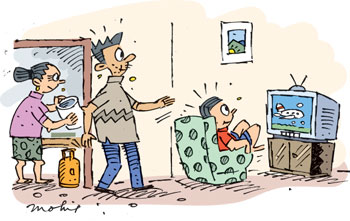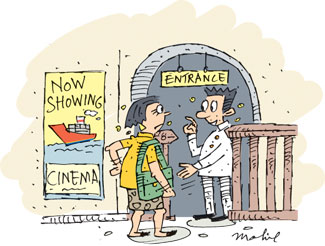|
 by
R. S. Karunaratne by
R. S. Karunaratne
More on the use of 'and'
and 'but'
We learned how to join two sentences using 'and' or 'but'. Today we
are going to learn how to join more than two sentences using 'and' or
'but'.
When the meanings of three simple sentences go well together, we can
join them with a 'comma' and then with 'and.' Look at the following
three sentences which go well together and how they are joined with a
comma and an 'and'.
Father is walking.
|

Sita loves cakes and Nita likes ice-cream but Francis does not
like sweets. |
Mother is cooking.
I am watching television.
Father is walking, mother is
cooking and I am watching television.
My brother is a lawyer.
My sister is a nurse.
I am a student.
My brother is a lawyer, my sister is a nurse and I am a student.
Dogs bark.
Geese honk.
Goats bleat.
Dogs bark, geese honk and goats bleat.
My sister is shy.
My brother is quiet.
My mother is kind.
My sister is shy, my brother is quiet and my mother is kind.
Sashi is a doctor.
Maheshi is a nurse.
Udeshi is a medical laboratory technician.
Sashi is a doctor, Maheshi is a nurse and Udeshi is a medical
>laboratory technician.
When the meanings of four or more simple sentences go well together,
we can join them with commas and then with 'and'.
Jessie barks.
Mother sweeps the floor.
Father reads the newspaper.
|

Father is walking, mother is
cooking and I am watching television |
Grandfather sleeps in his bed.
Jessie barks, mother sweeps the floor, father reads the newspaper and
grandfather sleeps in his bed.
Helen makes the cake.
Betty wraps the gift parcels.
Sue prepares short-eats.
Narmada arranges the hall.
Helen makes the cake, Betty wraps the gift parcels, Sue prepares
short-eats and Narmada arranges the hall.
Mother washes clothes.
Father cleans the garden.
Brother clears the cobwebs.
Sister sweeps the floor.
Mother washes clothes, father cleans the garden, brother clears the
cobwebs and sister sweeps the floor.
We use 'and' and 'but' together to join three simple sentences.
Malini is a shy girl.
Her sister is quiet.
Her brother is a boisterous youth.
Malini is a shy girl and her sister is quiet but her brother is a
boisterous youth.
Mary is in Kandy.
Harsha is in Bandarawela.
Shehan is in Dubai.
Mary is in Kandy and Harsha is in Bandarawela but Shehan is in Dubai.
Sita loves cakes.
Nita likes ice-cream.
Francis does not like sweets.
Sita loves cakes and Nita likes ice-cream but Francis does not like
sweets.
My sister is slim.
My brother is thin.
I am fat.
My sister is slim and my brother is thin but I am fat.
Activity
Fill in the blanks with 'and', 'but' or a comma. Check your answers
with the key.
1. The soldier's uniform was neat............. his shoes were
shining............... his sword was glistening.
2. Mother cooks............ my sister prefers to sew clothes
............... she does it well.
3. The wind blew ............... lightning flashed .................
it started raining.
4. Newton was exhausted .............. he wanted to rest ............
he had to answer the phone.
5. Kalyani sang ............. Narmada danced ............ they had
fun.
6. The farmer shouted ............... neighbours lit crackers
................ the elephant ran away.
7. Dasun ran to the bus halt ................. waved at a bus
................ it did not stop.
8. The car crashed into a small house ................ the driver was
injured ................ the only passenger was unhurt.
9. This is Hema's dictionary .............. that is Yasoma's pen
........... this is my pencil box.
10. My father is good at cooking ............... my brother is good
at sewing ............... I am not good at cooking or sewing.
[Key]
1. , and 2. , and 3. , and 4. and but 5. , and 6. , and 7. and but 8.
and but 9. , and 10. and but
Fun with proverbs
Proverbs consist of concentrated folk wisdom. They help us to write
effectively. Here are some popular proverbs with their meanings.
1. Not the only pebble on the beach
The proverb is used to say that a person is not indispensable and
there are others who can replace him.
2. On a high horse
When you are riding a horse, you have to look down if you want to
talk to someone. The proverb is used when a person ignores his friends
and well-wishers after succeeding in his ventures.
3. Once bitten, twice shy
When you go through a bad experience once you will be extra careful
in a similar situation in the future.
4. One man's meat is another man's poison
People are different and they like different things.
5. One picture is worth a thousand words
A picture says everything what words cannot describe.
6. One swallow does not a summer make
We should not come to a conclusion based on a few facts. We should
take the whole situation into consideration.
7. Opportunity only knocks once
Opportunities do not come our way every day. When an opportunity
presents itself, grab it.
8. Out of the frying pan and into the fire
The proverb is used when you move from a bad situation into a worse
one.
9. Paddle your own canoe
The proverb is used when a situation is controlled by one person.
10. Play second fiddle
One who is directly leading others but is following someone is
referred to as a second fiddle.
11. Play with fire
We use this proverb when we do something dangerous.
12. Possession is nine points of the law
A person who is in possession of a disputed property generally has a
chance of winning the right to ownership.
13. Prevention is better than cure
It is always better to prevent something disastrous from happening
rather than correcting it after it happens.
14. Pride goes before a fall
Anyone who indulges in pride or vanity is bound to meet with
disaster.
15. Procrastination is the thief of time
By putting off things, you will never be able to do it.
Starters:
Use of ‘have to’,
‘has to’ and ‘must’
‘Have to’ and ‘has to’ show the necessity for doing something or the
obligation to do it. ‘Have to’ is used with plural subjects and ‘has to’
with singular subjects.
I have to consult the doctor today.
You have to attend the board meeting.
He has to undergo an operation.
We have to follow the rules.
They have to pay the fine.
For the past tense we use ‘had to’.
I had to hire a cab yesterday.
|

You can’t enter the cinema. You
must have a ticket |
You had to pass the examination to get the job.
He had to pay the admission fee.
We had to wait in a long queue.
They had to climb the hill.
The question form is as follows:
Do I have to sign here?
Do you have to attend school today?
Does he have to bring all the books?
Do we have to remember all
these names?
Do they have to pay for their meals?
The negative form is as follows:
I don’t have to sign a bond.
You don’t have to wait for his arrival.
He doesn’t have to apply for leave.
We don’t have to come here every day.
They don’t have to pay for refreshments.
Use of ‘have to’ and ‘must’
We use ‘must’ when we say what
we think is necessary. However,
when we give our opinion we
usually use ‘
have to’.
‘Tarzan’ is a fantastic film. You must see it.
‘Titanic’ is an interesting film. You have to see it.
In many countries men have to do military service.
Anoma is a doctor. Sometimes she has to work at weekends.
I have no money today, so I have to borrow some.
You can’t enter the cinema. You must have a ticket.
In volleyball you have to hit the ball over the net.
Activity
Fill in the blanks with suitable words. Check your answers with the
key.
1. I .............. go home now. Some friends are coming for lunch.
2. You .................. wait to buy stamps.
3. He ............... raise a bank loan to put up the house.
4. Lalith ................ pass the examination to go abroad.
5. We .................... respect the dead.
6. Children ..................... obey their parents.
7. Luckily, she .............. pay the admission fee.
8. You .............. follow the road rules.
9. We ................ study well to pass the examination.
10. They ................... waste money.
************
[Key]
1. have to 2. have to 3. had to 4. has to 5. must 6. must 7. didn’t
have to 8. must/have to 9. must/have to 10. mustn’t
************ |

